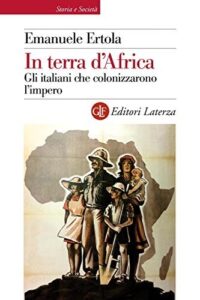This KNIR Research Dialogue includes two lectures which explore the concept of settler colonialism through the lens of Italian colonial history. Firstly, it considers whether the term “settler colonialism” can be applied to the Italian colonisation of Africa. Secondly, it addresses a key argument in settler colonial studies: the notion that settler colonialism necessarily involves the extermination of the indigenous population.
This KNIR Research Dialogue is also part of the workshop Biographies of (Post)Colonialism (KNIR, 9-10 October 2025) and of the SECOPS project.
Emanuele Ertola (University of Siena)
Italian Colonialism and the Question of Settler Colonialism
This lecture examines whether and how the category of settler colonialism can be applied to the Italian case. Long considered “exceptional” within the European colonial experience, Italian colonialism is increasingly reassessed through comparative perspectives and analytical frameworks originally developed for the British world. By questioning the notion of Italian uniqueness and testing the usefulness of transnational categories, the lecture reflects on the role of settlers in the Horn of Africa and beyond, highlighting what this approach can reveal about the dynamics of colonial rule, its afterlives, and Italy’s place in global histories of colonialism and decolonization.
Emanuele Ertola is Assistant Professor of Contemporary History at the University of Siena. He previously held postdoctoral fellowships at the Universities of Pavia and Siena. He completed his PhD at the University of Florence, after earning BA and MA at Sapienza University of Rome. His research focuses on Italian colonialism from both social and cultural perspectives, with particular attention to the dynamics of settler migration and return after the end of colonial rule. On these themes he has published, among other works, In Terra d’Africa. Gli italiani che colonizzarono l’impero (2017) and Il colonialismo degli italiani. Storia di un’ideologia (2022).
Ali Abdullatif Ahmida (University of New England in Maine, USA)
Settler Colonialism and Genocide: Confronting Eurocentrism, Silence, and Invisibility
This lecture presents a critical assessment of the reproduction of colonial historiography on settler colonialism and genocide and an alternative, innovative research on subaltern oral agency, based on Ahmida’s new book on the forgotten Libyan genocide and its causes, which originated in 1911 and evolved during WWI. The lecture will focus on the dominant scholarship and historiography; alternative critical scholarship; the history of fascist genocide in Libya based on the agency and narrative of a Libyan who survived the concentration camps between 1929 and 1933; and suggestions for a new research agenda based on a critical model of Italian Fascism.
Ali Abdullatif Ahmida was born in Libya and educated at Cairo University in Egypt and the University of Washington, Seattle. He is the founding Chair (2000–2014) of the Department of Political Science at the University of New England, Biddeford, Maine, USA. His areas of expertise are political theory, comparative politics, and historical sociology. His research focuses on power, agency, genocide, and anti-colonial resistance in North Africa, especially in modern Libya. He is the author of The Making of Modern Libya: State Formation, Colonialization and Resistance (1994, 2009); Forgotten Voices: Power and Agency in Colonial and Postcolonial Libya (2005); Bridges Across the Sahara (2009); Post-Orientalism: Critical Reviews of North African Social and Cultural History (2009); The Libya We Do Not Know (in Arabic, 2014). His most recent book Genocide in Libya (2021) was awarded the 2022 L. Carl Brown Book Prize from the American Institute for Maghrib Studies (AIMS). He is currently working on two books, one about after the genocide in colonial Libya, and a biography of Libyan freedom fighter Omar al-Mukhtar.
© images banner: Campo di sterminio di El abiar in Cirenaica – Archivio Manifesto | Francobollo Poste Coloniali Italiane



